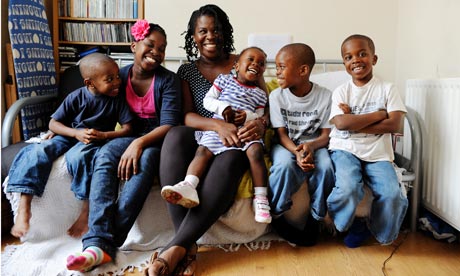
As a parent it can sometimes feel as if you are drowning in conflicting information about your child's requirements; what they should be eating, what they should be learning. But there is one area where we might all like a little more help; how to improve parenting skills that can be of long-term benefit to their mental health.
One in 10 children in the UK suffers from a diagnosable mental health disorder, and mental health issues for young people are an increasingly urgent concern. Now a pilot project in Southwark, south London, has found that teaching parents skills and techniques to better care for their children is having impressive consequences. The Empowering Parents, Empowering Communities course offers training in parenting, then teaches the mothers and fathers how to pass on what they have learnt. The results, for families in one of the most deprived boroughs in the country – where children have an above average likelihood of mental health problems – are being described as "inspirational".
Hunaida Osman took the original course at the Maudsley hospital and now teaches the techniques to other parents. "I was definitely the sort of parent who got angry easily and just shouted, 'Stop that'," she says. "I've got much better at explaining why I don't want my children to do something, and at praising them when they do something right. And it's been great for the parents I've taught too; for some families who are on a low income, living in crowded conditions, with children who are playing up, you really need a bit of help and support in the best ways to deal with those kids."
Nicola Williams, another parent teaching the course, says those whose children have mental health issues have been particularly pleased. "There was one mother who'd had a lot of trouble with her son. She came along for a couple of sessions, but she didn't have any faith in what the course could do for her. She didn't really want to get involved in it at all.
"We gave her a handout which was about a really simple technique, using little mood faces to show what sort of mood you're in; smiley faces if you're happy, that sort of thing. And it was amazing. Her son used them when he got home from school every day, and she said just knowing what mood he was in made everything much simpler."
Dr Crispin Day of the Institute of Psychiatry is evaluating the course as part of a long-term study. "About half the children whose parents are on the course have difficulties which would be equivalent to a diagnosed disorder, but the parents who go to the group are reporting that their children are showing a significant reduction in the severity of their behaviour problems."
Day has been running several groups simultaneouslyand early results are promising. For example, when parents were asked to say how concerned they were about their children on a scale between one to 10, levels on average dropped from approximately five-and-a-half out of 10 to two-and-a-half. Parents also filled out the Eyburg child behaviour inventory, which gives a score indicating how likely it is that the child may need clinical help (a score of 127 and over); the average score of the attending group dropped from just above 125 to 106.
Lessons to learn from the course
Start with yourself
You need to know that you are good enough. Think of it like a jug of water: you can't keep emptying yourself out to look after children around you without filling yourself up again.
Remember what it's like to be a child
Think back to your own childhood and recall how it felt when you said to your parents you were upset because no one wanted to play with you at breaktime. Then, as a parent, respond accordingly. Spend time with them and do something they like doing for a change, instead of trying to be in charge. Don't undervalue the importance of this: it can immediately shift things.
Descriptive praise
Be specific about what they have done, instead of just saying "good boy/girl". Learn to tell them what you want them to do instead of saying what you don't want: "Hold my hand tight", not "don't run into the road".
Explain your behaviour
It's important your child understands why you're doing what you're doing, so make sure you explain. And try to understand why they are behaving as they are.
Use sticker charts and star charts
Tangible rewards can teach and encourage self-discipline and end bad behaviour.

